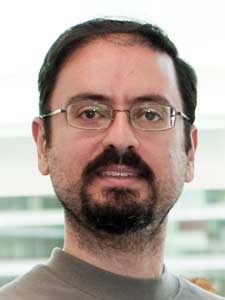Ioannis Nezis identifies mechanistic link between autophagy and cell death

In the August 23 issue of Journal of Cell Biology (impact factor 9.57), published on-line August 16, Ioannis Nezis and his colleagues in Harald Stenmark's group in the Centre for Cancer Biomedicine and Institute for Cancer Research reveal a mechanistic link between autophagy and programmed cell death.
Autophagy, a cellular process that involves lysosomal degradation of portions of cytoplasm, plays a role in tumour suppression by degrading potentially harmful damaged organelles. This process has also been implicated in programmed cell death, but the molecular mechanisms have remained elusive so far. Now, Nezis and co-workers have identified a novel link between autophagy and activation of caspases, proteases that are key effectors of programmed cell death. Using oogenesis in the fruit fly Drosophila melanogaster as model system, Nezis and colleagues have found that so-called nurse cells, which provide nutrients to the forming oocyte, die at a well-defined stage of late oogenesis, and that this requires autophagy. In the present paper, Nezis and co-workers show that programmed cell death of nurse cells requires degradation of a caspase inhibitor, dBruce. Importantly, degradation of dBruce through autophagy turns out to trigger caspase activation and cell death. This is the first description of a mechanistic connection between autophagy and caspase-dependent cell death, and these findings are likely to have implications for other programmed cell death processes as well. Parts of these studies were in collaboration with Prof. Eric Baehrecke at the University of Massachusetts, one of the leaders in the field of programmed cell death, and with the group of Terje Johansen at the University of Tromsø, who are internationally reknowned for their studies of autophagy.
Links:
The JCB article:
Ioannis P. Nezis's publications
Harald Stenmark's group: Intracellular communication
